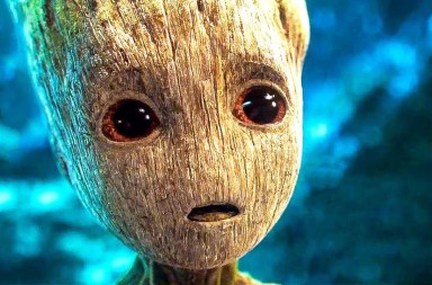While watching Volume 2, it gradually becomes apparent that this is the furthest from the overarching Marvel Connected Universe that the franchise has ever gotten. No more Infinity Stones are uncovered here, like in five earlier MCU films, and the series Big Bad guy Thanos is nowhere to be seen. This film only requires having seen the original, and it otherwise isn’t weighed down with plot from a dozen other superhero entries. I enjoy the interconnectedness of the MCU and the accumulative power that goes with it, but it’s surprisingly nice to have a break, especially when it’s as much fun as it is to hang out with these characters.
Freed from the strictures of franchise service, Gunn is able to focus on replicating the best parts of the original. That film had the seemingly impossible task of effectively introducing five new protagonists at the same time, the opposite of the MCU’s previous strategy of individually-focused films before the big team-up. With an irreverent tone and a kitschy, parodic feel, it succeeded despite its standard MacGuffin plot. Volume 2 keeps the tone and the feel and improves on the plot mechanics, leaving the characters to explore their psyches instead of chase after some something shiny. Motivations are clear, and where they clash, there’s drama. It’s as close to organic that a series now containing five monochromatic humanoid species is going to get. Gunn even manages to incorporate the much-vaunted retro soundtrack into a character-revealing moment. For a series that will ultimately be about thwarting a supervillain wielding colored gems (the green one stands for Time!), Volume 2 is deeply concerned with who its principals are.
It’s in that hunt for well-roundedness that Gunn gets into some trouble. There are too many scenes of a character telling another character exactly what they feel, and, against expectations, most of them don’t end with an undercutting joke. Tyler Bates’ score kicks up and suddenly, someone is being sliced through the middle with incisive psychological critique. This is the kind of self-seriousness that Gunn is otherwise poking fun at. In the original, he showed that he didn’t need it, with a brief shot of Rocket’s bare back, mangled by experimentation, enough to communicate the pathos beneath his cantankerous rodent exterior. These emotional check-ins slow the film down and don’t add much to what the audience knows about the characters.
In between sappy heart-to-hearts, Volume 2 is operating at a high level, both in the sci-fi realm and in the comedic one. Gunn mixes the cinematic with the vaguely scientific, recreating the Empire Strikes Back asteroid field scene but making it a quantum asteroid field, with the zooming rocks disappearing and reappearing at random intervals. Ego’s existence and purpose is something straight out of a yellowed book in the back corner of the library. The character even has museum exhibits in his home that look exactly like the cover of one of those dog-eared, off-brand Asimov’s. In its technology and weaponry, the film doesn’t have a lot of technical jargon, trusting the viewer to get the gist. The film’s sense of humor has in no way been dulled by blockbuster success, with some scenes feeling like a dare on Gunn’s part, like a key grip bet Gunn that he couldn’t interrupt a climactic battle with a search for tape.
On the acting front, the second-tier cast is the one to shine here. An afterthought in the original, Gillan makes a big impression beneath layers of prosthetics and makeup. Her Nebula boils with rage, but Gillan manifests real pain beneath it. New character Mantis (Pom Klementieff), an empath in service to Ego, has a wide-eyed curiosity that makes her the perfect foil to Drax, who she gets paired with. A character with no knowledge of interpersonal relationships having to learn from another character who always says exactly what he thinks is a gold mine. In a surprise twist, it’s Rooker’s Yondu who emerges as a near co-lead, with Gunn providing him with the richest role the longtime character actor’s had in years. For a blue scoundrel with a whistle-controlled arrow, he somehow becomes the emotional center of the film. Of the main quintet, Saldana gets more to do but is overshadowed by Gillan’s raw power, Cooper and Bautista reliably generate laughs and an occasional hint of sadness, and Baby Groot is the most adorable thing to come out of a Disney property since BB-8. That leaves Pratt as Quill, who draws the short end of the stick. I remain unconvinced that he can pull as much dramatic weight as the film asks him to. Exasperation, nonchalance, derring-do, sure, but his big emotional moments land flat.
Gunn’s knowing jabs of the genre, and of larger action filmmaking, help make Guardians of the Galaxy an integral part of the superhero universe. Someone has to demystify all this stuff, and the director of Super is the one to do it. His obvious love for deep-cut B-movies fits snugly with modern audience’s 80’s nostalgia, two ridiculous things that, when the right chef is stirring, become a delicious melange of futurist nonsense and modern irony. Heath Ledger’s Joker asked Why So Serious, but he did it in a superhero epic that many favorably compared to Heat. Gunn’s asking the same question, but in a film where a tiny tree-man brings a prosthetic eye to a cybernetic raccoon because the raccoon thinks it’s hilarious. I’ll take the latter anytime, even with one too many earnest speeches. B+

 RSS Feed
RSS Feed